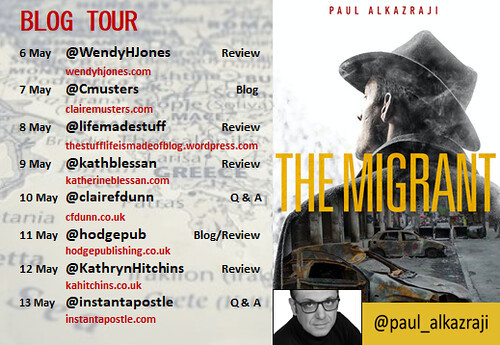Paul Alkazraji's Blog - Posts Tagged "albania"
Thriller is set against background of Turkey’s inner conflicts
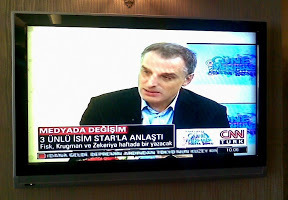
A British writer has had a thriller published that draws on Turkey’s recent inner conflicts and his experiences of the Balkans since he left the UK to live and work in Albania in 2003.
Set in Turkey, Greece and Albania, the story is about a man’s attempt to publish a book, and whether he will make it against setbacks and a danger that is approaching him with deadly intentions. “It is set against a background of church persecution in Turkey, murders and other true events there, including news revelations about the ‘Ergenekon’: a secret cabal plotting to destabilise the country for their own political objectives,” he says.
Entitled ‘The Silencer’, it has scenes in Istanbul and also tells the story of how one young man sets out on a mission of vengeance, caught up in the conflicts between Turkey’s secularists, Islamists and ruling conservative government.
“I hope I’ve been able to evoke some of the atmospheres of each of the Balkan countries, and tell a knife-edge story that grips to the final pages,” he says.
The author, Paul Alkazraji, worked as a freelance journalist in the Nineties and wrote the biographies of Bristol Rovers ex-football hooligan, Dave Jeal, and of Bristol missionary Ian Loring ‘Christ and the Kalashnikov’, as well as travel articles for London’s ‘The Independent’. Since 2004, he has run a magazine for churches in Albania.
“Initially, I went to Albania as a reporter just before the Kosovo crisis,” he says. “I went back again to write an earlier book and met my future wife there. We returned together to live in Albania in 2003, and we both still serve there with the local church. You never can tell how a single trip can change the course of your life!”
The Silencer
Published on June 03, 2013 09:04
•
Tags:
albania, ergenekon, greece, istanbul, justice-and-development-party, malatya, persecution, secularists, the-church, turkey
'The Silencer' giveaways coming... and 'Radio Radio'
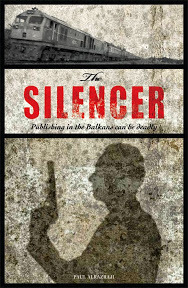
Alternative cover design for 'The Silencer' (unused)
Watch out for more giveaways of 'The Silencer' on Goodreads this summer in the UK, USA, Albania, Greece and Turkey. In the meantime, here's what two readers have said recently about it elsewhere...
Couldn't put it down
26 May 2014
'Really enjoyed this well written thriller. Having visited Albania myself it succeeded in capturing the true essence of the country. A real page turner.' Anne on Amazon UK.
'Paul Alkazraji does a great job at crafting a story that has both an exciting plot and time spent on developing the characters. It is well-paced, and difficult to put down but the author does not skimp on description. The back-drop of Albania especially is almost a character itself, as the author vividly describes what are clearly familiar aspects of culture and geography. The rhythm of life of the main characters is very realistic and in the end as the pace increases, the reader really cares about these people. I also found the inclusion of faith in the narrative handled realistically and sensitively. It would appeal to a wide audience of lovers of fiction and travel writing.' Anna on Amazon UK.
Radio Interview
Radio interview at Branch FM UK on 26/06/2014... Chatting about Albania, books, Norman Wisdom, ex-football hooligan Dave Jeal and 'The Silencer'...
Click here:
http://www.mixcloud.com/Branchfm/paul...
Published on June 08, 2014 09:49
•
Tags:
adventure, albania, christian, england, ergenekon, greece, mission, persecution, suspense, the-church, thessaloniki, thriller, travel, turkey
Pope Francis honours Albania’s persecuted and thanks ’alive’ church (+ radio interview)
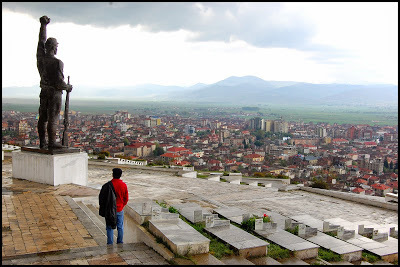
Communist monument in southern Albania.
By Paul Alkazraji in Albania (Sunday, September 21st, 2014).
Along the Boulevard of National Martyrs in Albania’s capital Tirana photos of the priests and nuns who fell victim to the country’s violent Communist persecutions were draped in remembrance before Pope Francis and the tens of thousands gathered on Sunday for the Mass and his homily.
In addition to the key themes of encouraging Albania’s young to build their lives in Christ, and fostering peaceful co-existence between the different religious communities, he drew attention to how the country had “suffered so much because of a terrible atheist regime”.
“Albania sadly witnessed the violence and tragedy that can be caused by a forced exclusion of God from personal and communal life,” he said. “When, in the name of an ideology, there is an attempt to remove God from a society, it ends up adoring idols, and very soon people lose their way, their dignity trampled and rights violated.”
After their rise to power near the end of WWII, the Communists decreed that the activities of all religious communities be supervised by the state. It was after Mao Zedong’s Cultural Revolution in 1966 spawned a similar movement in Albania, however, that the church faced its darkest hour.
Student agitators roamed the countryside forcing people to renounce their faith. The remnants of the fledgling Protestant church was driven further underground. Catholic and Orthodox priests were interned and over a hundred and twenty died through the harsh conditions, torture or execution. Outside a cemetery in the northern city of Shkoder many were shot by firing squad. Around 2000 churches and mosques were destroyed or converted into warehouses or gymnasiums. To achieve ‘the world’s first atheist state’ faith communities were obliterated.
Of those that survived to tell their stories the Franciscan Zef Pllumi emerged as an articulate voice through his book, ‘Live to Tell’, an account of his cruel treatment in internment camps. Often called the Albanian ‘Gulag Archipelago’ due to its similarities to Alexander Solzhenitsyn’s work, some find it difficult to even endure reading its narrative of suffering.
On that morning of Pope Francis’ visit, as I drove with the leaders of a new village church-plant close to the site of one of the places Zef Pllumi was imprisoned, at the Orman-Pojanit camp near Maliq, one told me a further story. It was of a priest who had been beaten about the head and buried alive there.
A second-century Church Father wrote those well-known words ‘the blood of martyrs is the seed of the Church’. Close to the periphery of that camp site, there are now two flourishing churches filled with happy, worshipping communities every Sunday, with a third also growing. At one, in a village, twenty new believers were baptised this summer. May it delight that priest in heaven to know it.
One of the new believers, a man in his seventies who lived through those times, waded out into the lake for his baptism with abandon in his long-johns, and speaks of how he could not imagine that his life would change so much at this stage. “I sleep much better. My heart is filled with the love of God, and praying all the time gives me new strength,” he says.
From Mother Teresa Square down the Boulevard of National Martyrs Pope Francis spoke the final words of his homily. “To the Church which is alive in this land of Albania, I say “thank you” for the example of fidelity to the Gospel! So many of your sons and daughters have suffered for Christ, even to the point of sacrificing their lives. May their witness sustain your steps today and tomorrow as you journey along the way of love, of freedom, of justice and of peace.”
End.
Radio interview on United Christian Broadcasters for the Paul Hammond Show about Albania and the Pope's visit (23/9/14): http://www.mixcloud.com/Muthena/pope-...
By this writer: The Silencer
The remnants of the Albanian protestant church discovered in 1991
(From Chapter 4 ‘Midnight by the railway tracks’, Christ and the Kalashnikov.)
Later that afternoon, as we hovered around the hotel lobby anxiously biding our time, I sensed that there were many others in the building watching us. At quarter to four, I glanced around at the team. It was time to step out, and my stomach seemed to rise like when speeding in a car across a humpbacked bridge. Together we walked through the glass entrance doors and around to the park at the rear. The security officer scurried quickly after us. As we crossed the grass my heart sank; there were little more than around thirty people ahead, casting their eyes around uneasily, and I couldn’t see Sokoli. I wondered if what we were going to try was led by the Holy Spirit or just foolhardy. We quickly set up a sketchboard to paint a visual message, and the YWAM team began to perform a short drama. It was then that I noticed something. All around the edge of the park, people were watching at a distance. As the presentation continued they began to edge timidly forwards, glancing at each other and us. As the drama drew to a close, we were surrounded by literally hundreds.
The moment in the programme had arrived to preach a short message, and yet no one spoke Albanian fluently enough to do it. I glanced around anxiously, grasping my Bible, and then began in English. Suddenly, a young man with curly, brown hair stepped forwards from the crowd. “My name is Ardian,” he said quickly, “I will translate for you.” As I continued to speak, Ardian relayed the message confidently to the crowd. My pulse was racing. I was amazed and I thanked God under my breath. I now watched the faces of those close in front of us as they stood jostling and craning their necks for a better view. As I spoke, I had never witnessed a crowd polarise so visibly to what they were hearing: an ageing woman in a black headscarf whose eyes narrowed as she pulled away; a teenage boy with a half-grown moustache whose mouth began to widen like a fish. It was as if a light was shining so clearly in the park that there were no grey areas, just highlight and shadow across the people’s faces. When Ardian finished translating, he concluded as if his heart had made its own choice as he’d stood there: “I know this message is true, because it was so for me,” he declared. I stepped back up onto the edge of a small, stone platform. By now the crowd had spread back across the grass. People were climbing up trees and standing on the tops of park benches, and around the edges of the grass were dozens of soldiers who had been listening in to the talk. Suddenly, shouting broke out at the rear of the crowd and people began to scatter across the grass. Four police cars had braked in the road, and the officers appeared to be arguing amongst themselves as well as trying to break through the people. The soldiers, however, were crowding up to them red-faced and pushing them back, waving their arms in the air. I looked back down at the team. It seemed like the right moment to leave. We packed up the equipment we had brought, and mingled in with the crowds as the park began to empty rapidly.
Back at the hotel, we were floating but afraid. No one could quite believe the response that we’d had, and how Ardian, whom I now remembered meeting briefly in Thessaloniki, had stepped forward publicly at great risk to himself. One black mark in your biography file could mean interrogations or worse, and the Sigurimi were always watching. Our brown-suited spy had seen it all, and we knew he’d make his reports. We held our breath and waited for the ensuing consequences throughout the evening.
A soft tapping came on the door of my hotel room at around midnight. My roommate looked anxiously across. I pulled on my shoes, and moments later turned the key in the lock. I opened the door cautiously. Outside in the corridor stood an old man with dark, bushy eyebrows and a warm expression. He held out his hand. “I am Ligor Çina, a member of the church in Korçë,” he whispered. He beckoned for us to follow him. I felt a little apprehensive, but at peace somehow that the man’s introduction was genuine. We locked the room and followed a couple of paces behind him down the silent hotel corridor.
Just five minutes walk from the entrance of the Hotel Iliria, we entered a small stone cottage, ducking to avoid the lintel. The interior was dimly lit and smelt a little of feet. Ligor gestured us through a further doorway where another elderly man with dark, sparking eyes sat regally on a wooden chair, his face half-lit by a single light bulb. A candle was flickering on the window ledge. Ligor introduced the man as ‘Koci Treska’. I stepped forwards and shook his hand. After we had sat across from him, he wasted no time in addressing us, and I waited for my roommate to translate. As I watched him talk, his manner seemed formal, yet I could see tears in his eyes. He brushed his cheek intermittently with his hand. Despite his frail physique, the man possessed a noticeable inner strength. I could feel my own tears welling up before I knew what he was saying. Shortly, my roommate turned to look at me.
“He says that he, Ligor and a handful of others are the only remaining members of a church stared before the outbreak of the Second World War… by two American missionaries, Kennedy and Jaques… They were the youth group,” he said, pausing whilst he too now steadied his voice. “He says that they have kept their faith secretly for over fifty years, and word reached him today that the Gospel had been preached on the streets of his town for the first time since the Communists took control. He wanted to meet us and to thank us. He has been praying for this day for years. He says that he is ready now to die with contentment.” I too now brushed my cheek. He reached forwards and for a couple of seconds we clasped hands. My roommate continued: “He says that we should go now, but he hopes that we will return here.” I was overcome – a lifetime of covert belief, and we were his first confidants. Koci now gestured towards the door. The meeting was over. As we stood up to leave, Ligor stepped ahead of us. Outside the cottage, he looked both ways. We shook hands firmly, and we scurried away along the dark, side street.
Copyright Paul Alkazraji. Christ and the Kalashnikov, Marshall Pickering. 2001. All Rights Reserved.
By this writer: Christ and the Kalashnikov
Published on September 25, 2014 03:36
•
Tags:
albania, alexander-solzhenitsyn, catholic, church, communism, cultural-revolution, mao-zedong, mother-teresa-square, orthodox, pope-francis, protestant, sigurimi, thessaloniki, ywam, zef-pllumi
The Berlin Wall fell 25 years ago this night...
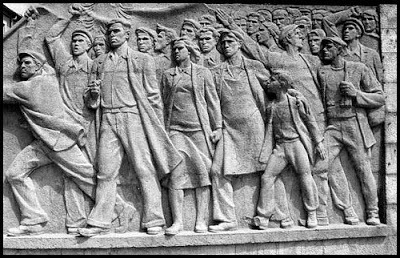
Twenty five years ago, on the night of Nov. 9, 1989, the Berlin Wall came down. East German authorities opened the border between East and West Berlin and the door to the fall of Communism across Eastern Europe. Stories of what happened in the lives of some of those who emerged ‘through the wall’ from half a century of isolation in one of those countries, Albania, are told in ‘Christ and the Kalashnikov’ and ‘The Silencer’. A little more can be found by reading on...
https://www.goodreads.com/review/show...
https://www.goodreads.com/review/show...
Published on November 09, 2014 10:10
•
Tags:
albania, berlin-wall, checkpoint-charlie, communism, eastern-europe
Behind the scenes... and personal
'The Silencer’ 2nd Anniversary of publication.
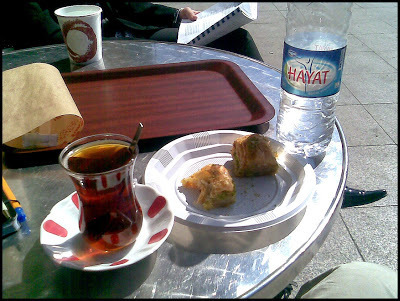
Doing table top research on the Ataturk Boulevard, Istanbul,
just watching...
(Here Sheref Dushman meets contacts and prepares to depart for Greece from Sirkeci Railway Station.)
During the field research I discovered that the 'Friendship Express' service between Istanbul and Thessaloniki had stopped altogether just a month before I wanted to take it. So I had to work out an alternative way of experiencing the journey Sheref makes. My wife and I found a coach trip for Istanbul from Albania on Women's Day 2011, and travelled roughly along the same route through the night, at times parallel to the railway lines. The excursion degenerated into chaos in Istanbul, though, as the passengers complained and demanded their own personal itineraries be met, and the organisers, who had had enough of them, dumped them all in vexation! Caught in the middle of it, we ended up locked inside the coach for over two hours. But that said, I was still able to do what I had set out to. I would have loved to have taken the train. As an aside, it is the first section of the route Bond travels with Tatiana Romanova and the 'SPEKTOR' machine in Fleming's 'From Russia With Love'.
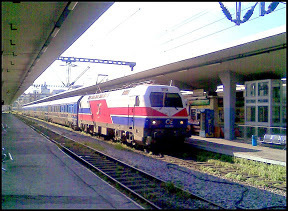
Thessaloniki Railway Station where I just missed catching ‘The Friendship Express’
(by about a month).

With my wife, Albana, and son Hanniel, 6, in Galicitsa Park, F.Y.R.O.M.
September, 2014.
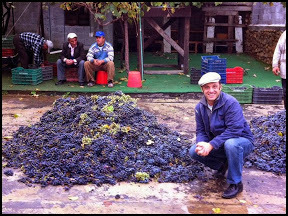
Gathering the grapes in a church yard, Albania.
Me, September, 2014.
By this author: The Silencer

Doing table top research on the Ataturk Boulevard, Istanbul,
just watching...
(Here Sheref Dushman meets contacts and prepares to depart for Greece from Sirkeci Railway Station.)
During the field research I discovered that the 'Friendship Express' service between Istanbul and Thessaloniki had stopped altogether just a month before I wanted to take it. So I had to work out an alternative way of experiencing the journey Sheref makes. My wife and I found a coach trip for Istanbul from Albania on Women's Day 2011, and travelled roughly along the same route through the night, at times parallel to the railway lines. The excursion degenerated into chaos in Istanbul, though, as the passengers complained and demanded their own personal itineraries be met, and the organisers, who had had enough of them, dumped them all in vexation! Caught in the middle of it, we ended up locked inside the coach for over two hours. But that said, I was still able to do what I had set out to. I would have loved to have taken the train. As an aside, it is the first section of the route Bond travels with Tatiana Romanova and the 'SPEKTOR' machine in Fleming's 'From Russia With Love'.

Thessaloniki Railway Station where I just missed catching ‘The Friendship Express’
(by about a month).

With my wife, Albana, and son Hanniel, 6, in Galicitsa Park, F.Y.R.O.M.
September, 2014.

Gathering the grapes in a church yard, Albania.
Me, September, 2014.
By this author: The Silencer
Published on December 04, 2014 02:40
•
Tags:
albania, from-russia-with-love, greece, ian-fleming, istanbul, ohrid, orient-express, sirkeci, the-friendship-express, thessaloniki, turkey
Macedonian Migration
Went to the Idomeni refugee/migrant transit camp on the Greek border with FYR Macedonia yesterday, which receives thousands of people per day on route for Germany and northern Europe. We drove the 600km round trip to give them our gifts of 90 litres of water, plastic sheeting for 19 families, medicines and a big sack of shoes. Here’s a snap. We had a blessed day!
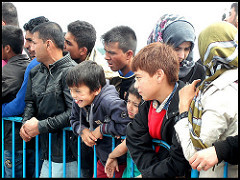
http://www.bbc.com/news/world-europe-...
‘Arrests have been made in the breaking of a people-smuggling gang by the French police in Calais, reports the Daily Mail. It’s believed to have smuggled 100 Albanian nationals into the UK, transporting them by boat to remote coves on England’s south coast between Weymouth and Plymouth…’ As such stories emerge, find out more about life in Albania through ‘The Silencer’; a novel set both there and in the UK.
https://www.goodreads.com/book/show/1...

http://www.bbc.com/news/world-europe-...
‘Arrests have been made in the breaking of a people-smuggling gang by the French police in Calais, reports the Daily Mail. It’s believed to have smuggled 100 Albanian nationals into the UK, transporting them by boat to remote coves on England’s south coast between Weymouth and Plymouth…’ As such stories emerge, find out more about life in Albania through ‘The Silencer’; a novel set both there and in the UK.
https://www.goodreads.com/book/show/1...
Published on October 01, 2015 05:45
•
Tags:
albania, calais, greece, macedonia, migration, people-smuggling, united-kingdom
Listen to the soundtrack of ‘The Silencer’
Listen to the soundtrack of ‘The Silencer'.
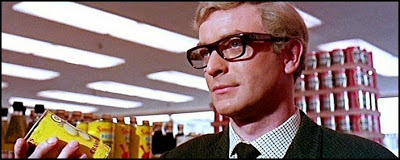
Michael Caine demonstrates how a proper omelette is made in ‘The Ipcress File.’
Can a book have a soundtrack? Well, perhaps only in the mind of the writer. But if you like a little music, or are just curious, you might find a listen to some of these songs adds another layer of flavor to the scenes in which they are mentioned. Here are some YouTube links to the ‘track list highlights’. Just click and listen!
In Chapter 22, the protagonist, Jude Kilburn, attempts what was probably not the most impressive impersonation of actor Michael Caine in ‘The Ipcress File’ using a honeydew melon. John Barry’s score evokes quintessential Sixties espionage coolness. http://www.youtube.com/watch?v=pBCqP7...
Alex Kilburn sings a song made famous in the film ‘Oh Brother, Where Art Thou?’, ‘Down to the River to Pray’, in the final chapter as goatherd boy Liridon takes a step of faith. Here Alison Krauss sings it.
http://www.youtube.com/watch?v=DbgfQ4...
Working off the premise that most people carry the pop music of their youth with them through their lives, I was looking for something that Alex Kilburn might sing that would speak about her mood in Chapter 9, as the pressures of life in a far away land mount up on her. Unlike myself, the Kilburns were students in the ’90s, and so I found it in Travis and ‘Why does it always rain on me?’
http://www.youtube.com/watch?v=PXatLO...
Just before tensions flare up between the married couple, Alex Kilburn sings the traditional gospel song ‘This Train is Bound for Glory’ in Chapter 17. This was my original choice for the title of the book, reflecting key elements of the story in both Jude’s and the antagonist’s lives. The sound quality of Sister Rosetta Tharpe’s version is poor… so turn it up!
http://www.youtube.com/watch?v=jOrhjg...
As Jude rides a ‘furgon’ (a minibus taxi) to the village of Shënvogël in Chapter 10, the driver puts The Human Leagues’ ‘Don’t you want me’ on the CD player. Surprising connections between them ensue and then the sing-along begins. “Such a clean sound,” says the Albanian driver.
http://www.youtube.com/watch?v=uPudE8...
With a suggestion of ‘His mercies’ that are to crown the story and enable Jude’s mission to succeed, Alex again sings this evergreen hymn in the final chapter. I stumbled upon these two ‘dudes’ giving it a really nice treatment: ‘Great is Thy Faithfulness’.
http://www.youtube.com/watch?v=hwWtWK...
By this author:


Michael Caine demonstrates how a proper omelette is made in ‘The Ipcress File.’
Can a book have a soundtrack? Well, perhaps only in the mind of the writer. But if you like a little music, or are just curious, you might find a listen to some of these songs adds another layer of flavor to the scenes in which they are mentioned. Here are some YouTube links to the ‘track list highlights’. Just click and listen!
In Chapter 22, the protagonist, Jude Kilburn, attempts what was probably not the most impressive impersonation of actor Michael Caine in ‘The Ipcress File’ using a honeydew melon. John Barry’s score evokes quintessential Sixties espionage coolness. http://www.youtube.com/watch?v=pBCqP7...
Alex Kilburn sings a song made famous in the film ‘Oh Brother, Where Art Thou?’, ‘Down to the River to Pray’, in the final chapter as goatherd boy Liridon takes a step of faith. Here Alison Krauss sings it.
http://www.youtube.com/watch?v=DbgfQ4...
Working off the premise that most people carry the pop music of their youth with them through their lives, I was looking for something that Alex Kilburn might sing that would speak about her mood in Chapter 9, as the pressures of life in a far away land mount up on her. Unlike myself, the Kilburns were students in the ’90s, and so I found it in Travis and ‘Why does it always rain on me?’
http://www.youtube.com/watch?v=PXatLO...
Just before tensions flare up between the married couple, Alex Kilburn sings the traditional gospel song ‘This Train is Bound for Glory’ in Chapter 17. This was my original choice for the title of the book, reflecting key elements of the story in both Jude’s and the antagonist’s lives. The sound quality of Sister Rosetta Tharpe’s version is poor… so turn it up!
http://www.youtube.com/watch?v=jOrhjg...
As Jude rides a ‘furgon’ (a minibus taxi) to the village of Shënvogël in Chapter 10, the driver puts The Human Leagues’ ‘Don’t you want me’ on the CD player. Surprising connections between them ensue and then the sing-along begins. “Such a clean sound,” says the Albanian driver.
http://www.youtube.com/watch?v=uPudE8...
With a suggestion of ‘His mercies’ that are to crown the story and enable Jude’s mission to succeed, Alex again sings this evergreen hymn in the final chapter. I stumbled upon these two ‘dudes’ giving it a really nice treatment: ‘Great is Thy Faithfulness’.
http://www.youtube.com/watch?v=hwWtWK...
By this author:

Published on May 04, 2017 12:59
•
Tags:
albania, alison-krauss, daniel-doss, joel-norman, john-barry, michael-caine, oh-brother-where-art-thou, sister-rosetta-tharpe, the-human-league, the-ipcress-file, travis
'The Migrant' to be published soon...
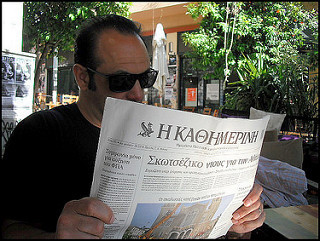
Some good news to share… I’m very happy to say that I just signed with a UK publisher for the novel I’ve been working on for a couple of years now – and finished, well, more or less. All being well, that should be out early next year. Hurray! (The photo is of me doing research for the story in Athens two years ago – well, pretending to read a Greek newspaper actually :) )
Early draft blurb for 'The Migrant' (working title).
‘No one has heard from Alban since he set off through the Albanian mountains to seek work illegally in Greece. Pastor Jude Kilburn is growing increasingly concerned. Could something have happened to the youth on route in the border forests? Could he remain safe in the Athens underworld if that was where he’d gone?
As the anti-austerity riots of 2012 explode, and the populist ‘Neo-Hellenic Front’ marches through the Greek capital, Jude gathers the help of two incompatible friends and sets off to find Alban. With him are Albanian Secret Service man Luan Gurbardhi, and reformed ex-criminal Mehmed Krasnichi. But can Jude keep his search party from falling apart?
When Donis Xenakis, a Greek riot-policeman and ‘Neo-Hellenic Front’ sympathiser, gets caught up in a diabolical plot to attack migrants, Jude could never have anticipated the unimaginable danger Alban is in. Nor can he foresee how a trafficked girl there will change all their outcomes.
‘The Migrant’ is a tense and evocative ‘road adventure’ with a powerful message and a tragic, yet ultimately redemptive, twist.’
Publisher: ‘Instant Apostle’.
Previously by this author:

Published on August 04, 2018 13:59
•
Tags:
2012, albania, anti-austerity-riots, athens, economic-crisis, greece, migration
Road trip with 'The Migrant'
A case of mistaken identity
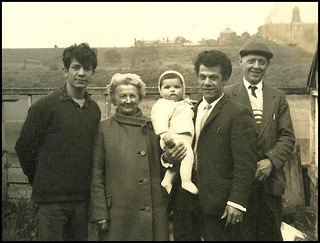
As I cycled along a city ring road once, my saddle was grasped from behind. A youth on a bike with cow horn handlebars scraped his shoe along the tarmac as he dragged us both to a standstill. He simply stared at me.
“What do… you want?” I said. He didn’t offer a word. His fist then slammed into my nose. He yanked back on his cow horns and wheelied off.
In the wake of the Black Lives Matter protests following the death of George Floyd, many previously silent people have given voice to their own experiences of racism. Like other mixed-race children growing up in England, I too felt a measure of it.
Another time, when I found a school door was locked, I tapped on the glass at a passer-by to let me in. He opened the door, showered me with a face full of spittle, locked it again and walked off. Sometimes, motives for actions were not stated; on other occasions, however, they were verbalised with venom.
I was aware then, though, that many English children were mistreated, often worse than me, for being different in some other way. Though my own experiences hurt, they were far outweighed by the friendship, help and affirmation I received from others in England as I grew up. Everyone needs to learn to forgive those who sin against them, as our own thoughts, words and deeds against others are forgiven.
When as an adult I moved to live and work with the church in Albania, I experienced racism from another angle: how some Greeks view those from their neighbouring country. When one Greek filling-station attendant eyed my Albanian car registration plate, I was actually refused petrol. I am stopped and questioned constantly by the Greek police on motorways, at road-toll stations and in supermarket car parks. Then, a cheerful ‘good morning’ and an offering of my British passport noticeably changes their attitude and my treatment.
This brings its own particular feeling of mistreatment: of being mistaken for something you know you are not. It perhaps gets to the crux of the matter: being seen as inferior, less human, potentially criminal even, on the basis of a wrong assumption. It has certainly made me more sympathetic to Albanians.
Many of these incidents of ‘mistaken racism’ were reworked into a novel I wrote called ‘The Migrant’. It tells the story of an Albanian youth who sets off to Greece in search of work and a better life, and three friends who set off to Athens to find him. There they encounter police brutality and casual racism on the roads, as well as populist rallies and organised attacks by a resurgent far right group.
On their way home, as the characters lament such struggles, they talk of a time and place where people of every race and nation will be welcomed and equally valued: where there will be no more crying and pain. Until then, there is longsuffering for so many, but it is eased with a sweet and certain hope that this place is prepared for us - and that we will get there.

'Racism... that's illogical captain!'
Paul Alkazraji's novel ‘The Migrant’ is published by Instant Apostle.
Find copies of ‘The Migrant’ here: https://www.amazon.co.uk/gp/product/B...


